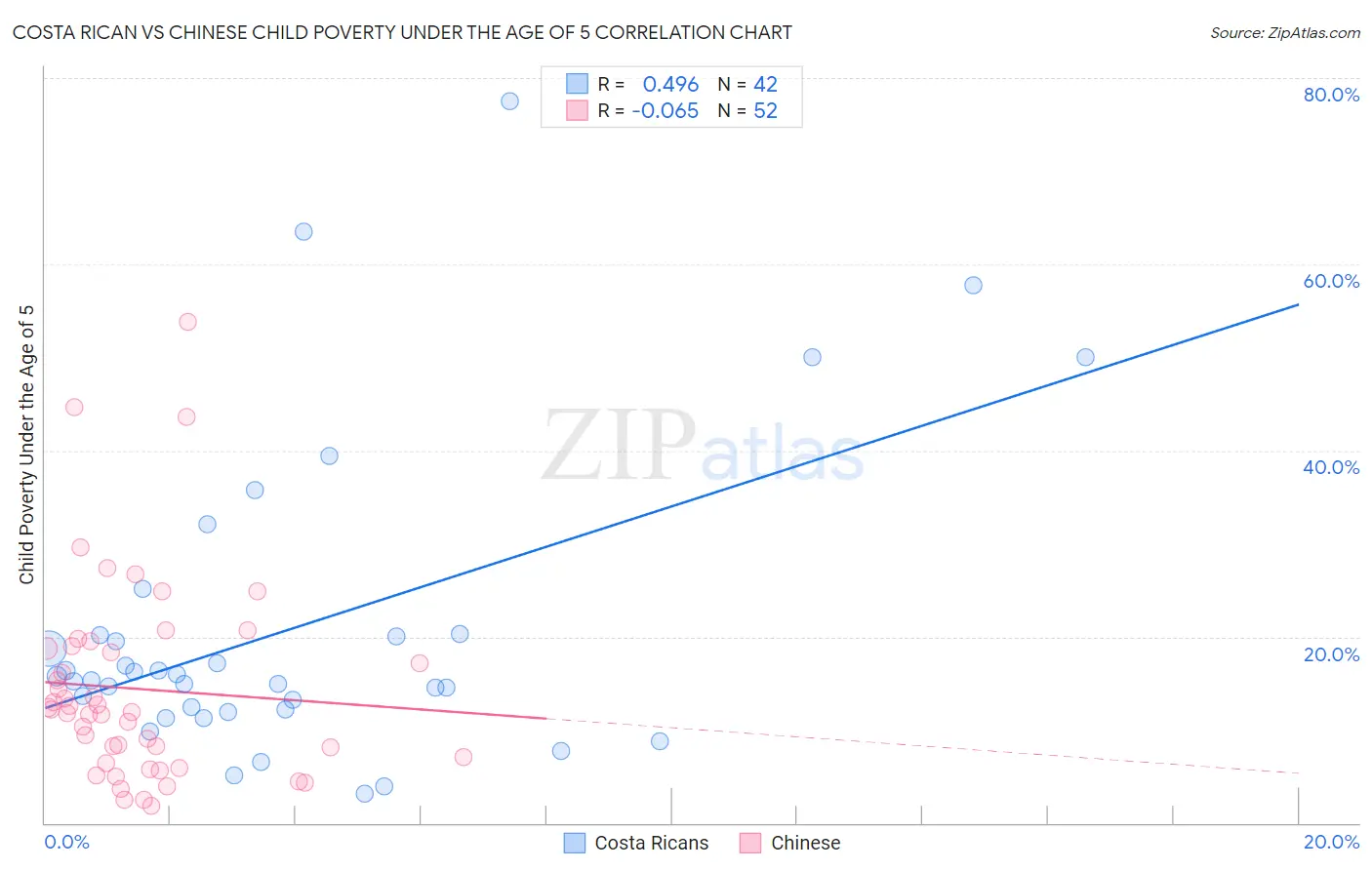Costa Rican vs Chinese Child Poverty Under the Age of 5
COMPARE
Costa Rican
Chinese
Child Poverty Under the Age of 5
Child Poverty Under the Age of 5 Comparison
Costa Ricans
Chinese
16.9%
CHILD POVERTY UNDER THE AGE OF 5
69.8/ 100
METRIC RATING
162nd/ 347
METRIC RANK
13.1%
CHILD POVERTY UNDER THE AGE OF 5
100.0/ 100
METRIC RATING
7th/ 347
METRIC RANK
Costa Rican vs Chinese Child Poverty Under the Age of 5 Correlation Chart
The statistical analysis conducted on geographies consisting of 247,728,653 people shows a moderate positive correlation between the proportion of Costa Ricans and poverty level among children under the age of 5 in the United States with a correlation coefficient (R) of 0.496 and weighted average of 16.9%. Similarly, the statistical analysis conducted on geographies consisting of 64,186,861 people shows a slight negative correlation between the proportion of Chinese and poverty level among children under the age of 5 in the United States with a correlation coefficient (R) of -0.065 and weighted average of 13.1%, a difference of 29.1%.

Child Poverty Under the Age of 5 Correlation Summary
| Measurement | Costa Rican | Chinese |
| Minimum | 3.1% | 1.9% |
| Maximum | 77.6% | 53.8% |
| Range | 74.4% | 52.0% |
| Mean | 21.0% | 14.4% |
| Median | 15.6% | 12.1% |
| Interquartile 25% (IQ1) | 12.2% | 6.7% |
| Interquartile 75% (IQ3) | 20.2% | 18.8% |
| Interquartile Range (IQR) | 8.0% | 12.1% |
| Standard Deviation (Sample) | 16.5% | 10.8% |
| Standard Deviation (Population) | 16.3% | 10.7% |
Similar Demographics by Child Poverty Under the Age of 5
Demographics Similar to Costa Ricans by Child Poverty Under the Age of 5
In terms of child poverty under the age of 5, the demographic groups most similar to Costa Ricans are English (16.8%, a difference of 0.060%), Scottish (16.9%, a difference of 0.15%), Immigrants from Oceania (16.9%, a difference of 0.27%), Irish (16.8%, a difference of 0.28%), and Immigrants from Syria (16.8%, a difference of 0.31%).
| Demographics | Rating | Rank | Child Poverty Under the Age of 5 |
| South Americans | 75.1 /100 | #155 | Good 16.7% |
| Afghans | 74.4 /100 | #156 | Good 16.8% |
| Venezuelans | 73.7 /100 | #157 | Good 16.8% |
| Czechoslovakians | 72.5 /100 | #158 | Good 16.8% |
| Immigrants | Syria | 72.3 /100 | #159 | Good 16.8% |
| Irish | 72.0 /100 | #160 | Good 16.8% |
| English | 70.4 /100 | #161 | Good 16.8% |
| Costa Ricans | 69.8 /100 | #162 | Good 16.9% |
| Scottish | 68.6 /100 | #163 | Good 16.9% |
| Immigrants | Oceania | 67.6 /100 | #164 | Good 16.9% |
| Immigrants | Colombia | 66.9 /100 | #165 | Good 16.9% |
| Slavs | 64.0 /100 | #166 | Good 17.0% |
| Immigrants | Uzbekistan | 62.0 /100 | #167 | Good 17.0% |
| Uruguayans | 60.5 /100 | #168 | Good 17.0% |
| Immigrants | South America | 60.0 /100 | #169 | Good 17.1% |
Demographics Similar to Chinese by Child Poverty Under the Age of 5
In terms of child poverty under the age of 5, the demographic groups most similar to Chinese are Iranian (13.1%, a difference of 0.020%), Immigrants from Iran (13.1%, a difference of 0.17%), Immigrants from Singapore (12.9%, a difference of 0.98%), Burmese (13.2%, a difference of 1.3%), and Immigrants from Korea (13.2%, a difference of 1.4%).
| Demographics | Rating | Rank | Child Poverty Under the Age of 5 |
| Immigrants | India | 100.0 /100 | #1 | Exceptional 11.5% |
| Immigrants | Taiwan | 100.0 /100 | #2 | Exceptional 11.6% |
| Filipinos | 100.0 /100 | #3 | Exceptional 11.6% |
| Thais | 100.0 /100 | #4 | Exceptional 12.3% |
| Immigrants | Hong Kong | 100.0 /100 | #5 | Exceptional 12.4% |
| Immigrants | Singapore | 100.0 /100 | #6 | Exceptional 12.9% |
| Chinese | 100.0 /100 | #7 | Exceptional 13.1% |
| Iranians | 100.0 /100 | #8 | Exceptional 13.1% |
| Immigrants | Iran | 100.0 /100 | #9 | Exceptional 13.1% |
| Burmese | 100.0 /100 | #10 | Exceptional 13.2% |
| Immigrants | Korea | 100.0 /100 | #11 | Exceptional 13.2% |
| Immigrants | South Central Asia | 100.0 /100 | #12 | Exceptional 13.3% |
| Bhutanese | 100.0 /100 | #13 | Exceptional 13.4% |
| Okinawans | 100.0 /100 | #14 | Exceptional 13.4% |
| Indians (Asian) | 100.0 /100 | #15 | Exceptional 13.4% |